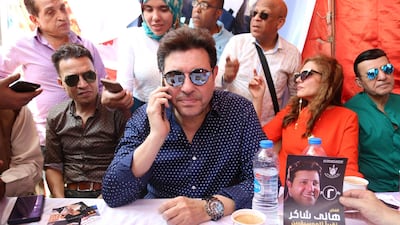Egypt’s union of musicians has banned a genre of street music that has taken the Arab nation of 100 million by storm, making deep inroads into mainstream art and being embraced by the poor and rich alike.
The union said the music, known as mahraganat or festivals, corrupted society with innuendo-filled lyrics, reinforced immoral customs and applauded decadence.
The weekend ban has unleashed anger and a flurry of satire from fans on social media. Thousands have decried what they see as an official body trying to make choices on behalf of people and enforcing the country’s still deeply conservative traditions as has been seen in everything from soap operas to movies and the evening news in recent years.
Mahraganat’s origins can be traced back to the 2011 uprising that removed the 29-year regime of Hosni Mubarak. It has since flourished in Cairo’s poor suburbs but also made huge inroads into mainstream music. It is a favourite at weddings, including those of the rich and powerful, and its star singers, who often go by outlandish stage names, have been celebrated on popular television talk shows.
For most of Egypt’s youth, the lyrics of mahraganat, overlaid on computer-generated beats, has spoken to their rebellion against patriarchy, disenfranchisement and a rejection of rigid societal norms that still exist in socially conservative Egypt.
Interestingly, mahraganat has moved into the mainstream over the years, widely accepted by many Egyptians who see it as their country’s home grown version of rap music with the kind of melodies that leave listeners of all ages with little choice but to get up and shake it.
Curiously, that has become the case despite risque lyrics that use some of the most vulgar phrases in Egypt’s colourful vernacular Arabic and that also shatter taboos in society while being irreverent to its moral pillars.
It also has transcended borders. It has been played by protesters in Lebanon, where a street movement against that country’s political establishment has been organising street demonstrations since October.
But for the union of musicians, led by 67-year-old singer Hany Shaker, the final straw came on Valentine’s Day when mahraganat singer Hassan Shakoush performed his latest hit – “Bent el Giran,” or the girl next door – at a 100,000-seat sports stadium in Cairo filled to capacity.
The union took exception to a line that fans enthusiastically sang along with Mr Shakoush in the concert that was broadcast live on regional television networks.
“If you leave me, I will hate my life, I will be lost and will not find myself again and use alcohol and hashish,” goes the offending line of the chart-topping song that has more than a 100 million views on YouTube.
The ban by the union is comprehensive. Mahraganat is now forbidden at cafes, on Nile boats, at concerts, in clubs and hotels. Offenders will be prosecuted, according to a statement by the union. It gave no details, but such offences are punished by a 10,000-pound fine or the closure of the establishment for thee months.
“There is a near consensus among all segments of society about the deteriorating conditions threatening the arts and general culture because of the so-called mahraganat music,” said the union’s statement. “Many of its lyrics are filled with innuendos that reinforce immoral customs.”
Mr Shakoush apologised to Mr Shaker, claiming that the offending line was replaced by more “agreeable” words, but a technical glitch caused a mix-up. He did not elaborate.
Despite the genre’s popularity, some supported the union’s move.
Television presenter Ibrahim Fayeq tweeted that he felt “grief” to see Bent el Giran performed at a stadium he called a “football sanctuary.”
Mr Fayeq’s comment drew a response from Mohammed Zaree, a prominent rights lawyer and a social media influencer.
“What football sanctuary and what stadium where the words alcohol and hashish should not be used?” Mr Zaree wrote in his Facebook reply. “The stadium has on many occasions heard language that is so much worse,” he wrote, alluding to the profanities that often lace the chants of football fans.
Writing for the online news service Almodon, novelist and political analyst Shady Lewis Botros acknowledged that a significant segment of Egyptians disapprove of mahraganat.
“Hany Shaker and his union play a secondary role that is both tragic and ridiculous but which is supported by a significant social segment that sees self-realization and empowerment in its participation in social media campaigns to boycott mahraganat,” wrote Mr Botros on Tuesday.
“The door has been slammed shut” on mahraganat, Mr Shaker, whose career spans multiple decades and is among one of Egypt’s most well-known singers, told a television interviewer this week.
The controversy over the ban, however, started a national conversation on the freedom of choice, raising questions on whether the government and pro-government media, state agencies and unions have too much power on what Egyptians watch or listen to.


